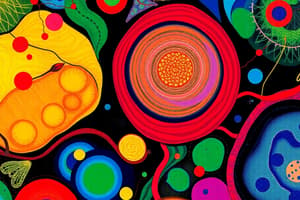Podcast
Questions and Answers
What is the basic unit of life according to cell theory?
What is the basic unit of life according to cell theory?
- Tissue
- Atom
- Cell (correct)
- Molecule
What does the study of zoology encompass?
What does the study of zoology encompass?
- Animal behavior, physiology, and classification (correct)
- Genetic variation in plants
- Microorganisms including bacteria and viruses
- Plant growth and classification
Which process converts glucose and oxygen into energy?
Which process converts glucose and oxygen into energy?
- Cellular Respiration (correct)
- Fermentation
- Photosynthesis
- Transpiration
In which branch of biology would you study heredity and variation?
In which branch of biology would you study heredity and variation?
What mechanism of evolution favors organisms that are better adapted to their environment?
What mechanism of evolution favors organisms that are better adapted to their environment?
Which hierarchical classification level comes after Kingdom?
Which hierarchical classification level comes after Kingdom?
What process do green plants use to synthesize foods using sunlight?
What process do green plants use to synthesize foods using sunlight?
Which technique is used to amplify DNA for analysis?
Which technique is used to amplify DNA for analysis?
Flashcards are hidden until you start studying
Study Notes
Overview of Biology
- Biology is the scientific study of life and living organisms.
- It encompasses various fields that explore the structure, function, growth, evolution, distribution, and taxonomy of living things.
Major Branches of Biology
- Zoology: Study of animals, including their behavior, physiology, and classification.
- Botany: Study of plants, including their structure, growth, and classification.
- Microbiology: Study of microorganisms, including bacteria, viruses, fungi, and protozoa.
- Ecology: Study of the interactions between organisms and their environment.
- Genetics: Study of heredity and variation in organisms.
- Molecular Biology: Study of biological processes at the molecular level, including DNA, RNA, and protein synthesis.
Key Concepts
-
Cell Theory:
- All living things are composed of cells.
- The cell is the basic unit of life.
- All cells arise from pre-existing cells.
-
Evolution:
- The process by which populations change over time through natural selection and genetic variation.
- Proposed by Charles Darwin; key to understanding the diversity of life.
-
Homeostasis:
- The ability of an organism to maintain stable internal conditions despite external changes.
-
Metabolism:
- The sum of all chemical reactions that occur within an organism, including anabolism (building up) and catabolism (breaking down).
Biological Classification
- Organisms are classified using a hierarchical system:
- Domain
- Kingdom
- Phylum
- Class
- Order
- Family
- Genus
- Species
Important Biological Processes
- Photosynthesis: Process by which green plants and some other organisms use sunlight to synthesize foods with the help of chlorophyll.
- Cellular Respiration: Process by which cells convert glucose and oxygen into energy, carbon dioxide, and water.
- Reproduction:
- Asexual: Involves a single parent (e.g., binary fission in bacteria).
- Sexual: Involves two parents and the fusion of gametes (e.g., fertilization in animals).
Techniques in Biology
- Microscopy: Use of microscopes to study cells and microorganisms.
- DNA Sequencing: Determining the sequence of nucleotides in DNA to understand genetic information.
- PCR (Polymerase Chain Reaction): Technique used to amplify DNA for analysis.
Evolutionary Concepts
- Natural Selection: Mechanism of evolution where organisms better adapted to their environment tend to survive and reproduce.
- Genetic Drift: Random changes in allele frequencies in a population, affecting genetic diversity.
Current Trends in Biology
- Advances in biotechnology, such as CRISPR gene editing.
- Development of synthetic biology and bioengineering.
- Focus on conservation biology and biodiversity preservation.
Overview of Biology
- Biology is the scientific study of life and living organisms, exploring diverse aspects of living entities.
- It includes disciplines focused on the structure, function, growth, evolution, distribution, and classification of organisms.
Major Branches of Biology
- Zoology: Investigates animal behavior, physiology, and classification.
- Botany: Examines plant structure, growth, and classification.
- Microbiology: Focuses on microorganisms like bacteria, viruses, fungi, and protozoa.
- Ecology: Studies interactions between organisms and their environment.
- Genetics: Analyzes heredity and variations in organisms.
- Molecular Biology: Explores biological processes at the molecular level, such as DNA, RNA, and protein synthesis.
Key Concepts
- Cell Theory:
- All living organisms are composed of cells.
- Cells are the fundamental units of life.
- New cells arise from pre-existing cells.
- Evolution:
- Populations evolve over time through natural selection and genetic variation.
- Proposed by Charles Darwin, crucial for understanding life diversity.
- Homeostasis:
- Organisms maintain stable internal conditions despite external fluctuations.
- Metabolism:
- Encompasses all chemical reactions within an organism, including anabolism and catabolism.
Biological Classification
- Organisms are categorized in a hierarchical taxonomy:
- Domain, Kingdom, Phylum, Class, Order, Family, Genus, Species.
Important Biological Processes
- Photosynthesis:
- Utilization of sunlight by green plants and some organisms to create food using chlorophyll.
- Cellular Respiration:
- Conversion of glucose and oxygen into energy, yielding carbon dioxide and water.
- Reproduction:
- Asexual reproduction: Single parent (e.g., bacteria through binary fission).
- Sexual reproduction: Involves two parents and gamete fusion (e.g., fertilization in animals).
Techniques in Biology
- Microscopy:
- The use of microscopes to observe cells and microorganisms.
- DNA Sequencing:
- Technique to determine nucleotide sequences in DNA for genetic analysis.
- PCR (Polymerase Chain Reaction):
- Method utilized to amplify specific DNA sequences for further study.
Evolutionary Concepts
- Natural Selection:
- Mechanism where organisms adapted to their environment are more likely to survive and reproduce.
- Genetic Drift:
- Random changes in allele frequencies that impact genetic diversity within populations.
Current Trends in Biology
- Innovations in biotechnology, such as CRISPR gene editing for genetic modification.
- Growth in synthetic biology and bioengineering applications.
- Increasing emphasis on conservation biology to preserve biodiversity and ecosystems.
Studying That Suits You
Use AI to generate personalized quizzes and flashcards to suit your learning preferences.




